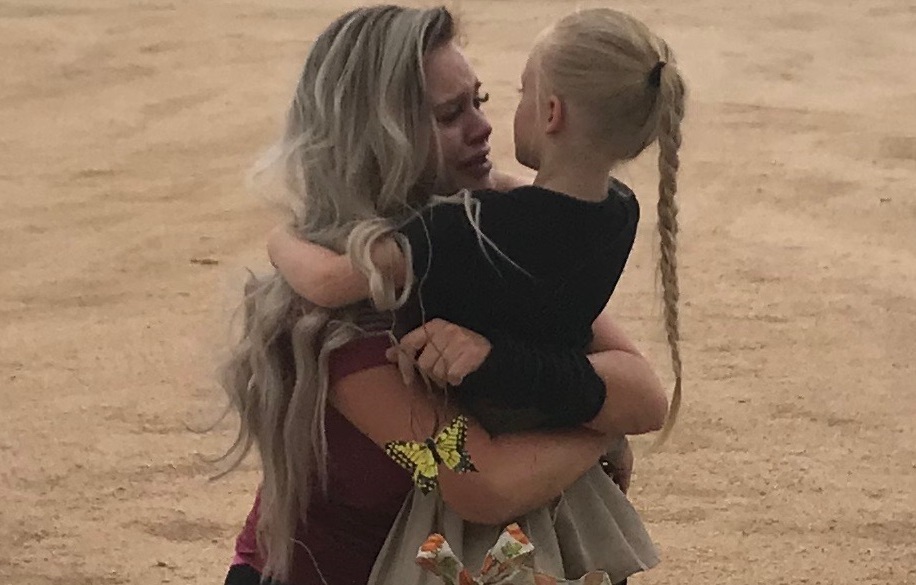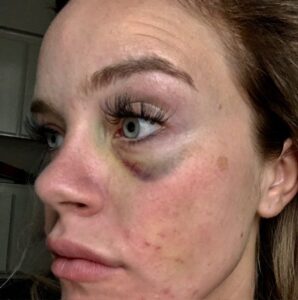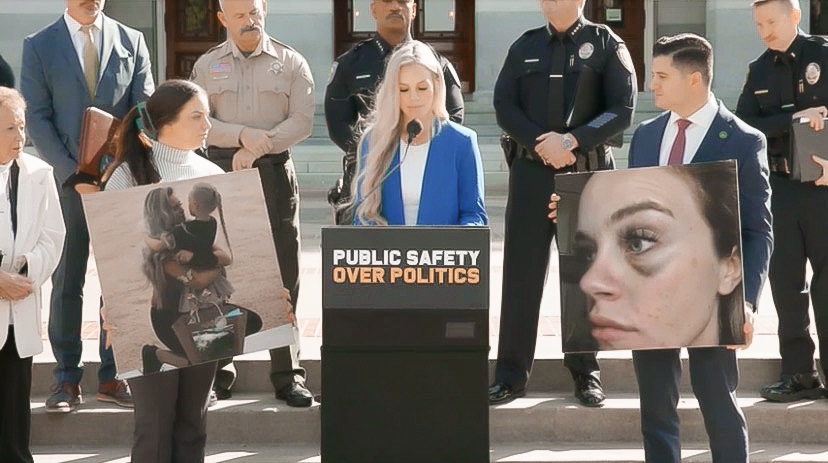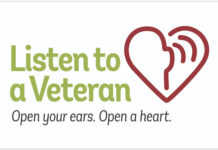Overwhelmed by despair and feeling like a shell of myself, I made a decision in August of 2021 that still haunts me. I swallowed a handful of pills, hoping to escape the pain and confusion. I grabbed my handgun from my safe and planned to take my own life. I was tired of fighting. This was the only way out. Two years earlier, I’d been prescribed a litany of psychiatric drugs as treatment for a life-threatening event I experienced as a San Bernardino Deputy Sheriff. As the August heat hung heavily in the air, hopelessness churned within. I texted my husband, “You need to come home.” He did and he saved my life. That night became a turning point—a wake-up call for me and those around me.
I’d responded to a 911 call; a mom needed help from her son, who’d threatened to kill her that morning. I had handled these types of calls countless times before. But that day, September 4, 2019, everything changed. In an instant, I thought of my six-year-old daughter. I’d taken her to kindergarten that morning. We never say goodbye; it’s always “I’ll see you after school.” Who would pick her up from school now? Who would be there to get her ready for her wedding day? I was about to be executed with my own sidearm.

Not even a minute into my arrival on the scene, the suspect began assaulting me. Grabbing me by my hair, attempting to pull me to the ground, he punched me over and over and over again to the side of my face and head. Despite my years of training in de-escalation attempts, verbal commands, defensive tactics, control holds, less-lethal methods, I was losing this fight. I was starting to lose consciousness. We fell to the ground, him on top of me. I took aim at his head, attempting to save my own life. He trapped my hand above my head, and we began to fight over my firearm. A round discharged into the ground, sending gravel and dirt flying. He ripped the gun from my hand. I remember pleading with this stranger to spare my life. “Please, no, please don’t.”
Somehow, I turned to my hands and knees, looking up toward the suspect and down the barrel of my gun. I heard the trigger click. But my body wasn’t done fighting. I ran for the nearest cover I could find, a bush and a fence. I heard another gunshot go off; he shot at my back as I ran away. My partners arrived just in time to spare me from being hunted down. He went to the hospital—subdued and in custody—for his wounds, and I went to the hospital for mine.
Injuries: Visible and Invisible

In spite of my concussion, broken left thumb, and broken zygomatic arch bone—often mistaken by outsiders as “just a black eye”—I thought I was coping well in the days and weeks that followed. I was prescribed Valium immediately, along with Flexeril and Norco. The medications caused my stomach to feel like an acidic cauldron, twisting itself into knots. I could hardly tolerate food or even water. Flashbacks hit me unexpectedly, triggered by the slightest sound or smell.
Though I continued packing my daughter’s lunch, taking her to school, doing laundry, and making dinner, I avoided situations that reminded me of that day. I found myself at home during the times I used to be at work but expected I would return shortly to the job I had loved. Within a few weeks, Paxil and Ambien were added to the prescription cocktail.
The nightmares started soon after, though, relentless and vivid, replaying that moment over and over again. I still remember one recurring nightmare that I had at least once a night for months, still feeling the terror it wrought in my exhausted body: Somebody broke into our house, tied us all up, and I had to choose which of us would die. The nightmare seemed so real that it made me have a waking response to it. The false reality almost became a real tragedy. I didn’t understand why my husband was still in bed. I rushed to the closet and loaded a magazine into a rifle, terrified that the attackers were coming, that they would force me to choose who in my family would die.
In an unending state of panic and paranoia, I began to withdraw from friends and family. I became a recluse, hiding in my bathroom or bathtub most of the day, afraid of the world.
Protocol
Concerned for my well-being, my department referred me to a psychiatrist specializing in trauma. He immediately diagnosed me with Post-Traumatic Stress Disorder (PTSD) and prescribed Trazodone and Klonopin. These were added to, not replacements for, what I was already taking. The drugs were coming to me every thirty days in my mailbox. One was for anxiety, one was for sleep, one was to help my heart rhythm for panic attacks—something for everything I described and couldn’t understand was happening to my body.
At first, the medications seemed to help dull the edge of my anxiety. But as time went on, I started feeling detached from reality. The world around me seemed hazy and distant, until common stimuli jolted my senses into high alert. I could no longer engage in hobbies I’d once enjoyed. My husband and I, being cops, loved to go to the range and shoot. The first time I held a gun after the incident, I dropped to my knees and bawled my eyes out. We took my daughter to Disneyland for her sixth birthday that October, but there were so many people in line behind me that I had a panic attack. The sight of so many balloons, the thought of them popping, unraveled me. We had to leave an hour after we’d arrived.
My symptoms worsened as time passed. I couldn’t pump my own gas or go to the grocery store to buy milk. I didn’t want to be around anyone, not even my family. My mom and dad tried gently to get me out of the house, to go to breakfast. My friends wanted to come and drop off food or a white chocolate mocha, but I told them not to.
As a female in law enforcement, I’d always had to push harder and do more. Slowing down was a sign of weakness; inactivity meant irrelevance. PTSD effects and treatment were never discussed, even as my trauma kept re-surfacing worse than before and the medications meant to help me were driving me further into darkness. In my department-sanctioned therapy, I realized I could not be honest about how deeply I was struggling, nor could I question the treatment I received because it would appear I was not being compliant. I knew these things would be reported to my supervisor, and I just wanted to return to work. If my boyfriend (now husband) and I broke up, I needed my job. I needed to provide for my daughter.
My New Identity?
In June 2021, I was deemed permanent and stationary, meaning I would never be able to return to law enforcement again. I no longer shopped in stores, talked to my friends, or enjoyed anything that once made Meagan, Meagan. Soon after, I received a letter in the mail from workman’s compensation: my therapy benefits had expired. I had used all 250 hours the department would pay for, and because I was not fit for duty any longer, they would not continue paying for therapy. Three hundred dollars an hour to pay out of pocket for a counselor? How could I ever afford this when I’d lost my income, my job, my career. We were now forced to live on my husband’s salary with expenses that were quickly adding up to more than our mortgage. But the pills never stopped coming.
Every month, a tan-colored package arrived, filled to the brim with my medications. They had become my escape. My therapy. This was now the only treatment I was receiving. I was never warned of the side effects of these medications. I had never contemplated suicide until I became dependent on the little pills that would lead me down that path. I never suspected this was medication-driven. I thought it was just me.
Not Alone
Two years after the attack, I was moments away from doing the very thing I’d fought so hard to prevent. The day my husband came home and saved me was the day my life began to change for the better. He arrived, saw me, and panicked. “What did you do??”
“I’m done fighting,” I told him. “I can’t do this anymore. Just let me go.” I told him I’d taken a handful of pills. He took me to the bathroom and made me throw up. When he went to the other room to check on our one-year-old son, I retrieved the handgun. He returned, took the gun, and locked it away. He called my parents, who immediately came over. My dad sat next to me on the couch and asked to hug me. I didn’t see the point, but he wrapped me in his arms. I knew then that if I died, I would hurt others and not just me. My dad would never be able to hug me again.
Slowly, with the support of my family, friends, and a different treatment plan, I began to reclaim my life. I sought a second opinion from a psychiatrist specializing in PTSD and trauma recovery. Together, we cut my medication as I knew I couldn’t have these small bottles in my house—I was now convinced they were going to kill me. We incorporated therapy techniques like cognitive-behavioral therapy and eye movement desensitization and reprocessing (EMDR). I began to finally heal and take my mental health seriously. My kids deserved a mom who was present, alive, and healthy. I deserved to be Meagan again.
It wasn’t easy. Recovery from PTSD and from all the drugs I was prescribed was a journey filled with ups and downs, setbacks, and breakthroughs. But gradually, I started to regain control. I returned to life with a newfound sense of purpose—to help others who might be struggling with trauma like I did. I developed gastrointestinal issues, causing more chronic issues from the overmedication, as well as hormone issues, causing me to be on weekly injections and hormone therapy to re-balance my body. During the medicated madness, I believed the assault and associated trauma had ended my career, but I now believe it was the medications and their effects. My experience taught me the importance of advocating for oneself, seeking second opinions, and finding the right balance of treatment modalities. Today, I’m grateful for every small victory and for the chance to share my story, hoping it might help others going through similar struggles.
But now, I realize that the mental health crisis in our law enforcement professions, veteran community, and our world is due in part to the lack of care from doctors who actually want to heal the person, instead of just managing symptoms. I know how it feels to consider an unthinkable act just to escape. I realize how crucial it is for healthcare professionals to understand the complexities of trauma and the risks of overmedication. This can change—and must change—through education, litigation, and legislation. Our people deserve better.
















Thank you for your service as a first responder and making it clear what first responders have to face every day. Its too easy to say ” defund the police” and send in social workers instead to resolve mental health crises when the reality is that some individuals are really afraid of a family member, especially if they are high on drugs or in an altered or extreme state and crisis responders themselves can be at great risk.
Thank you also for speaking openly about your experience being overmedicated for PTSD. PTSD is widespread and is rarely treated appropriately in our sick and twisted mental health system.
The press is starting to cover stories of PTSD in the Veteran’s and first responder community but not so much as it concerns other populations such as kids in foster care who are traumatized by past sexual, emotional,and physical abuse, domestic abuse survivors, natural disaster victims, immigrants fleeing from civil wars, former gang members, school shooting survivors, and all survivors of forced psychiatry ( ex-patients who are routinely restrained, secluded, forcibly shocked, forcibly injected, etc.) All of thesepopultiins are routinely overmedicated and put in chemical straight jackets, especially BIPOC.
This issue requires all hands on deck. New allies to this cause from the first responder community are much needed to raise public awareness of iatrogenic harm by psychiatry which impacts millions of America. Just visit one of the akasthisia groupson Facebook to see how deadly psychiatric drugs can be!!
Report comment
I was inpatient, when I listened to a first responders retelling of the trauma, that had brought him in (actually his co-workers had intervened on his behalf).
The public has no idea, about the trauma faced bravely, by our first responders. And not just once, but over and over again.
“Walk a mile in his shoes”. I can’t even begin to imagine.
As he told his story, cries of anguish could be heard coming from “the quiet room”.
Report comment
MIA should remove the words “social justice” from its banner, as it’s now publishing copaganda and FOX contributors that really don’t need the extra platforming. What an insult to your readers.
Report comment
MIA gives a proper stage to critique about police use in mental health crises, which is great. It also gives space to the stories of military and police personnel who have unique issues when being traumatised at work and suffering the consequences – for example, the (unethical?) lack of medical confidentiality and the reporting channel between her treating professionals and her supervisors, as described in the blog. I think it’s fair enough.
Report comment
Post traumatic stress is NOT a “disorder”; it is part of the healing process. Releasing it somatically over time can be better than numbing it with “medications”.
Report comment
As much as I am saddened to hear about any other person dealing with PTSD and suffering from suicidal ideation, I don’t love that MIA is now sharing stories highlighting the struggles of sheriff’s deputies. The psychic damage done to any officers will never be remotely commensurate with the harm policing causes – it is inherently a violent institution that traumatizes and kills; we have enough copaganda in this country without platforming people like this.
Report comment
Research shows that benzodiazepines (Klonopin, Ambien) are not helpful (and can be detrimental) in treating PTSD. Prescribers need to pay attention to the evidence.
Report comment
Meagan McCarthy demonstrates that no-one is exempt from poor responses to extremely traumatic life events. Not even cops. They had her gulping a pill for every ill as though her suffering was some kind of captcha puzzle.
This is what happens when you decontextualise human beings.
To move forwards Meagan McCarthy had to contextualise herself and her suffering.
However, I fear she may now be unwittingly stuck. Because she cannot or will not contextualise her assailant, Ari Young, who suffers from schizophrenia, or contextualise her actions and his reactions.
Ari Young walked from Court a free man because she attempted an unlawful arrest and he lawfully resisted. She pointed a gun at his head and in doing so left no doubt that his life was in mortal danger. He fired her gun as she ran away. That must have been extremely frightening for her. However, forensics established that Ari Young did not fire the gun in her direction.
When back-up arrived he was shot and taken to hospital.
A police officer does not have the right to make an unlawful arrest, no matter what hunches they have. They do not have the right to execute someone resisting false arrest by shooting them in the head. And they do not have the right to send this person to prison for many, many years, for resisting an unlawful arrest.
The line has to be drawn and it has to be maintained. No matter the circumstances. No matter how violently someone resists an unlawful arrest. The line of the Law, the upholding of Law, has to be maintained.
Report comment
Thank you for providing salient information and a more complete picture of what transpired.
Events like these make the argument for having SWs embedded in our policing. I wonder, when calling for help, did Ari’s mother indicate to anyone that he was experiencing a MH event? That seems like a key piece of data, and if the responding police did not have it, they were set up for failure. (And in that arena, the current US policing model does not heed any help.)
I think the point of the article was how the medical model fails us. Would Meagan’s story have served as well if she had skipped the first part–explaining HOW she became traumatized? I think so. Will her unwillingness/inability to humanize Ari, impact her healing? Maybe, probably.
Like everything, it’s complicated.
Report comment
From what I can gather from legal documents Ari’s mother rang for assistance with her son’s mental health issues, requesting assistance to remove him from her home. She had also rang the previous day requesting assistance.This information was made available to Meagan but despite attending alone she chose not to access this contextual information.
Source: https://followourcourts.com/2024/03/partially-acquitted-defendant-sues-sb-county-sheriffs-over-altercation/?rm_success=1&rm_form_id=3&rm_sub_id=4510
So maybe set up to fail. Given it was logged as a serious incident. You’d think someone might have told her the context as she made her way there?
Report comment
So you’re citing information you believe as truth and evidence from him filing a lawsuit? What a joke you are. Why don’t you cite the 700 page police report that’s public knowledge? The United States attorneys office has charged Ari with 3 federal felonies. She did her job, exactly how she should have. The district attorney failed, not the officer. Get your facts straight before you spew lies.
Report comment
Yo, Otzi, HOW DO YOU KNOW that the guy “suffers” from so-called “schizophrenia”?….
Maybe he loves every minute of it?….
Seriously, the pseudoscience drug racket and social control mechanism known as “psychiatry” is the true culprit here….
Why don’t you blame THEM?….
Report comment
Hello, Bill.
Generally speaking, if someone loved every minute of schizophrenia then they wouldn’t attract the label of schizophrenia. They’d be Uri Gellar or Alex Jones or David Icke or some eccentric person we can’t name, or suchlike.
Why don’t I blame psychiatry and pharmaceuticals for a tragic incident in which a mother called assistance for the distressing behaviour of her son, who had been diagnosed with schizophrenia, who consequently was the victim of an unlawful detainment, which he fought off, and which may have ended in both his death and the death of the unlawfully acting officer, but instead seems to have ended in his permanent physical disability, due to having at least 7 bullets shot into him, the last one being when he was on the ground, reeling from the first 6 bullets, completely immobilised, then deliberately shot in the base of his spine?
Why don’t I blame psychiatry and pharmaceuticals for all that?
Because I’m not a zealot with one blunt axe to grind.
However, if you can provide some evidence as to why I should, then I’d consider it.
I feel very sympathetic towards Meagan. It’s terrible what she went through. But Ari went through something terrible too and it’s too easy, isn’t it, to de-voice some people. Us, I mean. You and I.
He’s lucky to be alive. I hope he’s able to agree with me.
AFTERTHOUGHT:
If there is another narrative, in which Ari is the victim, like Meagan, of over-drugging, and that his behaviour that day, and preceding days, were the result of psychiatric drug effects, then yes, Bill, that would stand as a potent narrative for Meagan to consider, given her experiences of psychiatric drugging.
To this day few people are able to make the association between extreme anger and rage, and the use of antipsychotic and antidepressant medication.
Report comment
Right? These are systemic fails. That’s what we see every day–everywhere–our systems failing. Policing is a failing system, mental health care is a failing system, etc. Or maybe the correct word is “flawed.” But from what I see–failing.
Report comment
“Otzi” : I really hope you see this comment. I’m very serious here.
YOU, Otzi, are very, very confused about several points here.
You do NOT understand what I’m saying, and you have completely mis-characterized my words & meaning. Let me do my best to untangle your confusion. OK?….
First, may I assume that I am correct in thinking that you are calling me
“a zealot with one blunt ax to grind”? It certainly sounds to me that you are attacking me with that bullshit ad hominem attack. So are you? If you are, you’re very wrong, and needlessly insulting. I’m a well-honed super deluxe Swiss Army Knife of multiple super sharp, keenly reasoned perspectives and knowledge bases….
My resume/CV includes 2 DIFFERENT State Mental Hospital stays of almost 11 months total, several “mental health unit” stays of months total, at the local general hospital, and a few rehab & detoxes. Plus, a short State Prison bid of 6months, 4 stays in jails in several States. No felony convictions. No violence, beyond “disorderly”, “drunk”, “drugged out”, etc.
More mostly bogus & bullshit arrests that I can count. AND TODAY, decades of SOBER, PSYCH-DRUG FREE RECOVERY. I’m almost 35 years post-psychiatry. After psychiatry nearly KILLED ME several times…. But no, I ain’t been shot, yet…. AND TODAY, there are literally dozens of local City, County, & State Police who are MY FRIENDS….most of them even seem to usually like me….and usually respect me. More or less.
No, let’s GET REAL, dude….
So-called “schizophrenia”, like ALL such diagnostic LABELS, is exactly as “real” as presents from Santa Claus….but NOT MORE REAL….
“Schizophrenia” was NOT “discovered”, which would mean “real”….
It was INVENTED, and CREATED….which means FAKE….
Your turn….
Report comment
Since 2015, the NYPD alone has executed 20 people in the course of responding to mental health crisis calls. Interestingly, in the 20% of call responses which are answered by unarmed responders (social workers and EMTS), zero people died. Peer responders remain the best choice for helping in these situations. But the problem is national and the death toll is immense. It occurs to me that a police officer who is no longer in denial about having been in mental health crisis could perform an important service: Tell your fellow officers to refuse to bring guns or other weapons to mental health emergency calls. It is time for us to be as peer support to our fellow humans in distress. The data is clear; cops, leave the guns at home when you are helping folks get through mental health crisis. This is part of the road to human rights for our people.
Report comment